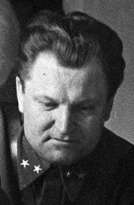Alexei Kirichenko
Alexei Illarionovoich Kirichenko (Russian: Алексе́й Илларио́нович Кириче́нко; 12(25) February 1908 – 28 December 1975) was a Soviet politician. Between 1957 and 1960, he was a Secretary of the Central Committee of the Communist Party of the Soviet Union and the second-highest ranking official within the party after Nikita Khrushchev.[1]
Alexei Kirichenko | |
|---|---|
 | |
| Second Secretary of the Communist Party of the Soviet Union | |
| In office 17 December 1957 – 5 April 1960 | |
| Preceded by | Mikhail Suslov |
| Succeeded by | Frol Kozlov |
| First Secretary of the Communist Party of Ukraine | |
| In office 12 June 1953 – 26 December 1957 | |
| Preceded by | Leonid Melnikov |
| Succeeded by | Nikolai Podgorny |
| Full member of the 19th, 20th Presidium | |
| In office 12 July 1955 – 4 May 1960 | |
| Member of the 20th Secretariat | |
| In office 17 December 1957 – 5 April 1960 | |
| Personal details | |
| Born | 25 February [O.S. 12 February] 1908 Kherson Governorate, Russian Empire |
| Died | 28 December 1975 (aged 67) Moscow, Soviet Union |
| Nationality | Soviet |
| Political party | Communist Party of the Soviet Union (1938-1962) |
| Profession | Mechanical engineer, civil servant |
Biography
Kirichenko was born in the village Chornobayivka of Kherson Governorate, Russian Empire in a family of Ukrainian factory workers. From the age of 11 he started earning for living by working in the fields and then at railways. After graduating from a mechanical school he worked in Kazakhstan as an engineer in a sovkhoz. He then returned to Ukraine to receive a university degree (1936) and teach agricultural engineering. In 1938, he became a member of the Central Committee of the Communist Party of Ukraine and in 1941 its Secretary of Industry (later in 1949 he was promoted to the 2nd Secretary and in June 1953 to the 1st Secretary). During World War II, serving as a party functionary, he was promoted to the rank of lieutenant general. In 1953, he became a member of the Presidium of the Supreme Soviet and in 1957 one of the secretaries of the Central Committee of the Communist Party. During 1957–1960, Kirichenko was effectively the second-highest ranking person in the Communist Party after Khrushchev, who was his patron since the 1930s. However, Khrushchev gradually became disappointed with Kirichenko whom he saw as a somewhat arrogant bureaucrat, not capable or willing to understand and solve the management problems, either on the national or international scale. As a result, in 1960 Kirichenko was demoted to the position of the first secretary of the Party Committee of Rostov Oblast and retired in 1962. He died in 1975 and was buried at the Novodevichy Cemetery in Moscow.[1]
According to Enver Hoxha, in the midst of the Soviet-Albanian split an Albanian military student studying in the Soviet Union had met Kirichenko during a train ride. The latter said to him, "Good for your Party, which exposed Khrushchev. Long live Enver Hoxha! Long live socialist Albania! . . . Don't yield, give Enver my best wishes!"[2]
References
- Микалай Аляксандравич Зянькович (2002). Самые закрытые люди: Энциклопедия биографий. Olma Media Group. pp. 246–248. ISBN 978-5-94850-035-5. Retrieved 6 August 2012.
- Hoxha, Enver. The Khrushchevites. Tirana: 8 Nëntori Publishing House. 1984. pp. 202-203.
| Party political offices | ||
|---|---|---|
| Preceded by Nikolai Kiselyov |
1st Secretary of the Communist Party of Rostov Oblast 1960–1960 |
Succeeded by Aleksandr Basov |
| Preceded by Leonid Melnikov |
First Secretary of the Communist Party of Ukraine 1953–1957 |
Succeeded by Nikolai Podgorny |
| Preceded by Anatoliy Kolybanov |
1st Secretary of the Communist Party of Odessa Oblast 1945–1950 |
Succeeded by Aleksei Yepishev |